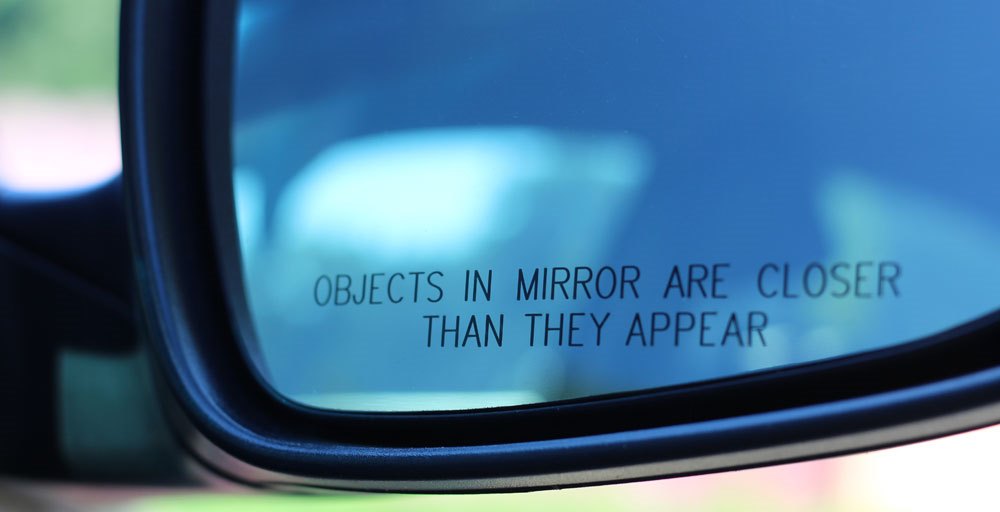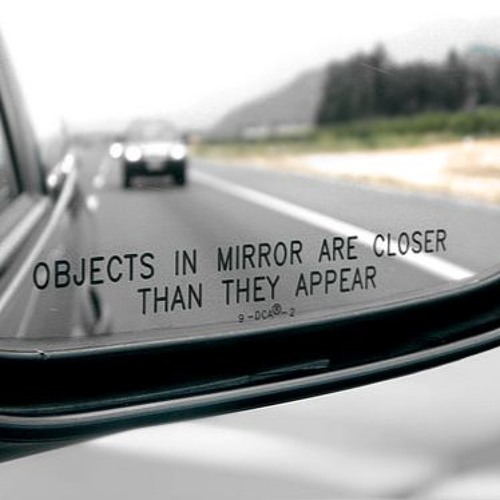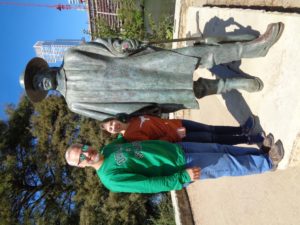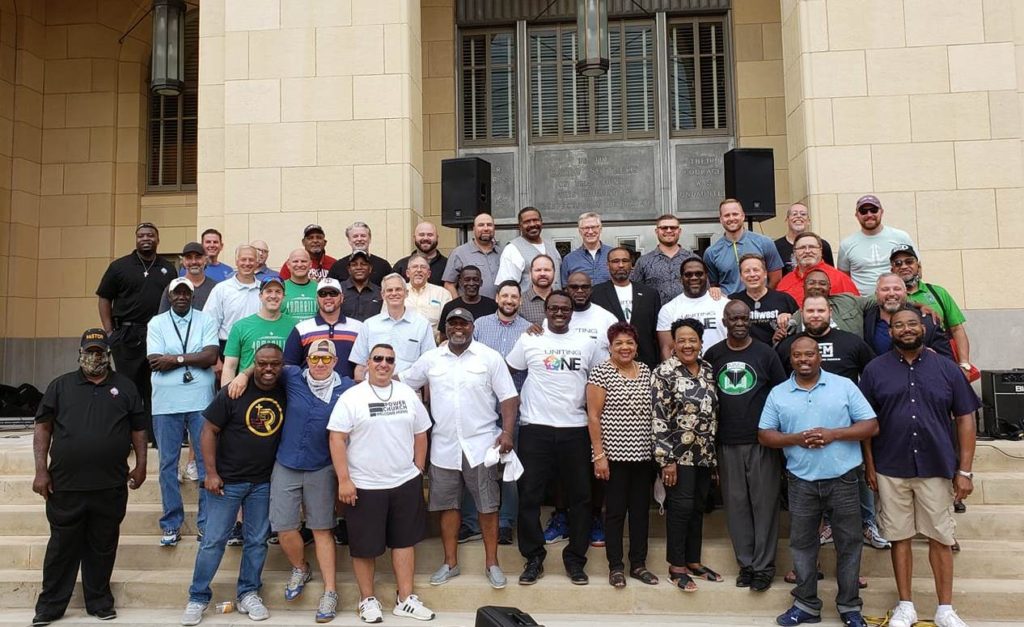You are familiar with the warning etched into the bottom of the passenger’s side-view mirror on your car: Objects in mirror are closer than they appear. This authoritative statement is located on the passenger’s side-view mirror, but not the driver’s side. Why?
Your driver’s side-view mirror is just a standard flat-surface mirror. Your eyes are less than 18-inches away from that mirror and there’s hardly any angle. You can see almost everything behind you on that side through that mirror. But a normal mirror doesn’t work on the passenger’s side. The driver’s eyes are at least six feet away from that mirror and the angle is extremely sharp. A flat mirror would only allow you to see a tiny sliver of what is behind you on that side. So those mirrors are convex in shape. To compensate for the increased distance between you and the mirror and the severe angle, the passenger’s side mirror bulges out in the middle and curves away toward the sides to give you a wider view. You can see much more with the wider angle, but it comes at a price. The wider focal point compresses the image so it makes the objects appear to be smaller and farther away than they really are. Hence, the warning: Objects in mirror are closer than they appear.
Every time you get behind the wheel, you are reminded that what you are seeing on that side is a lot bigger and a lot closer than you think. That’s what the warning is all about. This thing in the mirror is closer than it looks. It will impact you sooner than you think. You need to act on this, and your response is important. Time is short. The gap is small. It’s closer than it appears to be.
There is a similar warning for us in the Bible. It should probably be heard or read as a comfort.
“The hour has come for you to wake up from your slumber, because our salvation is nearer now than when we first believed. The night is nearly over; the day is almost here.” ~Romans 13:11-12
It feels like night. It has for a while. We were told at the end of March that we only needed 15-days. If we shut everything down for 15-days, we can flatten the curve and avoid any real crisis. Fifteen days and we’ll be good.
That was nine months ago. And we’re not good. I’m not good. Are you? I feel like I’m in a fog. Sometimes I feel like I’m just going through the motions. I don’t know what to do. I’m not sure anybody really knows.
We have a vaccine now, praise the Lord. It seems like a miracle we’ve received the vaccines so quickly and we should be thanking God for this answer to our prayers. But most health officials are saying the darkest days of the pandemic are still ahead. And now a new strain? It feels like nobody knows what to do and nobody knows when it’s going to be over.
Our salvation seems like a smaller thing in the face of all the suffering and loss that surrounds us. The dawn of a new day feels a long way off in the suffocating darkness of the present.
We all have questions as we head into the new year. When will the coronavirus crisis end? How will the vaccines work? Is 2021 going to be better than 2020, or will it just be more of the same? Will handshakes and hugs ever be normalized again? What about my own peace of mind? My own sense of well-being? Lots of questions.
Romans 13 reminds us of what the Bible affirms for us over and over again: that we belong to a God who does his very best work in the dark and his deliverance is always closer than you think.
What we see right now can throw us off. You know, it is possible to focus too much on the coronavirus and develop a distorted view. We can pay too much attention to the experts. We can watch too much news and get sucked into a false narrative. We can scroll through too much Facebook, we can read too many emails and websites, we can easily lose sight. Our salvation can seem much smaller than it really is. And farther away. The presence and power of our God can appear to be smaller and farther away.
We need an authoritative statement on the fronts of all our phones and etched into the bottom of all our screens: God’s presence and power is closer than it appears! God’s rescue is closer than you think!
New life always begins in the dark. A seed in the ground. A baby in the womb. Jesus in the tomb. A church in a pandemic. A Christian in despair. We can believe the night is nearly over and the day is almost here. You can have faith in the middle of your fears. You can be calm and certain through your anxieties. You can experience true life even as you walk through the valley of the shadow of death.
Because we know what the prophet Micah knows: “Though I sit in darkness, the Lord will be my light.” And we know what our Lord has promised: “I am with you always, to the very end of the age.”
Which is closer than you think.
Peace,
Allan









Recent Comments